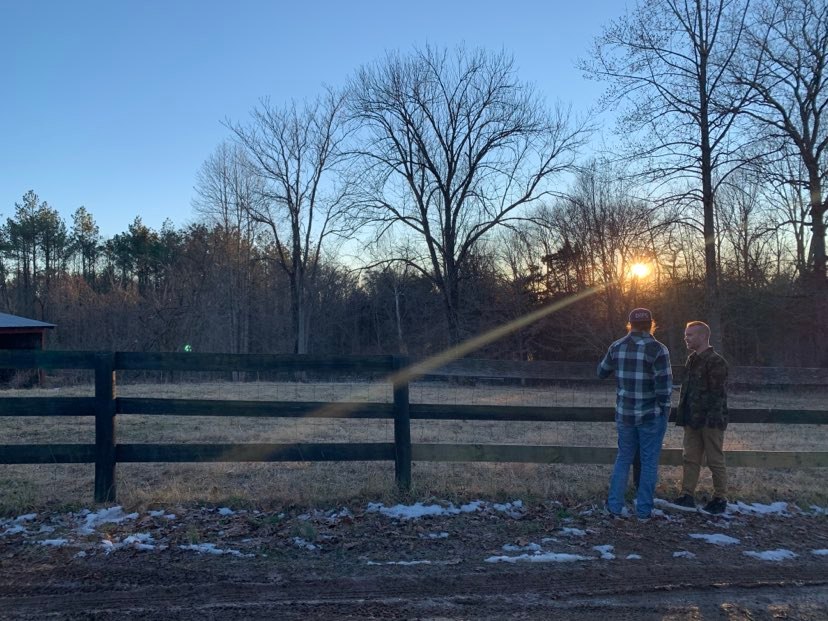My introduction to The Movement occurred over a decade ago with their 2008 album, Set Sail. Instantly, this album vaulted to one of my favorites of all time, where it remains today, now amongst more recent LPs from these rising reggae-rock stars. After being blown away by 2016’s Rootfire Cooperative release, Golden, I wondered if the band could ever put out another record that stoked my fires with same ardor.
This past July, The Movement emphatically quashed my doubts with the release of their latest LP, Always With Me. Following the formula of their previous two albums, the band recorded Always With Me at White Star Sound, a studio located on a historic farm outside of Charlottesville, VA. However, unlike the previous two albums, this time the band decided to self-produce the project. “Every part of a Movement record seems to happen organically. It seems to take on a life of its own,” explained singer and guitarist, Josh Swain. “We originally planned on working with a producer, but it just didn’t end up happening. We realized that we didn’t really need one, and we were confident that we could do it ourselves.”
Swain added that this decision was fueled by the official addition of keyboardist/multi-instrumentalist Matt Goodwin to the band. Goodwin, who had previously performed with progressive roots pioneers John Brown’s Body, not only plays keyboards and horns, but also has refined studio skills. “Having Matt Goodwin in the band has been a complete game-changer,” said Swain. “So really, we were working with a producer/engineer, he just happens to be in the band.”
While The Movement had collaborated with Goodwin previously, making him a full time member undoubtedly gave them a boost. On the surface, the addition of horns is a welcomed element to their music. Going deeper, however, his role in the studio had a major impact on the evolution of the band’s sound. “As I said before, Matt is a game changer. This record is as much his influence as it is mine,” credited Swain. “I don’t just hand over control without serious consideration. But me and Matt, we’re just two peas in a pod. We think alike. Ultimately, we want the same outcome. He has elevated every part of The Movement, from the music to the live show, to the attitude and energy with which we now walk. And we owe a huge part of our current success to him.”
Producing their own record did have its downsides, Swain mentioned, such as “not having a third party set of ears to help create objectively.” Yet, ultimately, this choice served them well. “There is a freedom and a brotherhood that we have together. We’re not afraid or embarrassed to push boundaries, and it gave us the control to do exactly anything we wanted.”
Goodwin added, “I think there’s something unique about being stripped down to the core members. We’re brothers at this point. Relying on our own creative intuitions and pushing each other in ways we are comfortable doing. There was a really joyous creative spirit going on.”
 Not only did the band produce the album themselves but in keeping with that intrepid spirit, they released the album on their own imprint, R4RE Records. “These days, in my opinion, there’s no reason for us to release on a label,” stated Swain. Then, mulling it over a bit, added, “I guess if we were approached by a major label and were offered an amazing deal, we would consider it. But, realistically, we’re just not that big yet. We haven’t been approached and may never be. Rootfire offered an amazing opportunity when we released Golden, but since then we have been ok operating under that umbrella, with Ineffable as our management, and self-funding albums.”
Not only did the band produce the album themselves but in keeping with that intrepid spirit, they released the album on their own imprint, R4RE Records. “These days, in my opinion, there’s no reason for us to release on a label,” stated Swain. Then, mulling it over a bit, added, “I guess if we were approached by a major label and were offered an amazing deal, we would consider it. But, realistically, we’re just not that big yet. We haven’t been approached and may never be. Rootfire offered an amazing opportunity when we released Golden, but since then we have been ok operating under that umbrella, with Ineffable as our management, and self-funding albums.”
While the idea to produce and release the album independently came relatively easy, one of the more difficult decisions the band faced was selecting which of the 22 songs they had recorded for Always With Me to include on the album. “It is a hard decision,” Swain admitted. “Usually, as the release date gets closer and closer, there are some songs that are in better shape than others, and those are the ones we try to focus on. There will be some tunes that we can just tell are going to need more time.”
Have no fear, though, Movement fans, when the time is right, those tracks should eventually make their way to your ears. “We will definitely release at least a few of those songs, if not all. Maybe as singles, maybe on the next record. Some were absolutely strong enough, but we just needed more time to really bring them to the finish line. And there were a few that weren’t strong enough yet, and I really needed to focus on what they were missing.”
Swain’s discerning ear serves The Movement well. With every new album, his immense talent continues to flourish. With the aforementioned addition of the horns as well as a bit more of an electronic element, Always With Me subtly probes a new sonic landscape yet still maintains the Movement vibe that fans know and love. While songs like “Afraid,” “Elephant” and “High Roller” have an edginess to them that fits right into the band’s signature sound, tunes such as “Beg, Borrow & Steal,” “Jungle” and “Actor” nose into pop territory, making this album perhaps the most accessible yet.
The press release mentions that Swain had heard a “rare jungle mixtape of Bob Marley remixes” during his younger record store clerk days, which had long ago inspired him to incorporate more electronic music in the group’s sound. We have heard glimpses of this on previous albums, but Always With Me features this element in a more prominent way. Swain expanded: “A lot of this record was written on a computer. Many of the demo riddims were strictly digital. And sometimes a sample just sounds better than the real thing.”
Continuing, he said, “A live room can add a vibe to a song, but for most of the songs, we wanted a more aggressive feel. Electronic music has made its way into almost every modern record. 808s, synths, and sampled trap hats can sometimes just give a song that extra umph it needs to make it pop.”
Ironically, Swain’s favorite songs on the album did not begin on a computer. “I tend to prefer the songs that I started writing in my room, by myself, just me and my acoustic,” he shared, mentioning “Always With Me” and “U Don’t Know Me” as examples. “They’re just more personal, and I get to see the whole metamorphosis, from the first lyric, to the final edit.”
Despite a few softer or slower moments, Always With Me is predominantly energetic. Not to be overlooked, the order of the tracks flows effectively, with the latter half of the album seemingly alternating with harder/uptempo songs and lighter, more downtempo songs. This keeps the listening experience refreshing and engaging. “I had a general idea of how I wanted to order the songs but when I listened, it seemed that there was a slight lull in the middle of the record,” Swain explained. “It was Matt who threw ‘Chainz’ right in the middle to liven it up, and then we usually try and alternate vibes just to keep it interesting. If you’re not feeling a tune, just hit skip and more than likely the next one will be more your speed.”
Lyrically, the songs on Always With Me largely fall into one of two categories: love songs, and songs that speak to overcoming adversity. Swain has faced his share of personal struggles, but thankfully turned his life around, and that pivot has had a profound effect on his outlook and artistry.
 “I’ve been sober for the majority of the past eight years,” revealed Swain. “I don’t think I would be writing this right now if it weren’t for that. I feel like The Movement had good records and bad, and all the good ones came about as a direct result of my sobriety. Everything in my life and art were impacted by that decision. Everything I do now is authentic, it’s me. I make decisions with a clear conscience and an unclouded mind. I don’t need any substance to spark creativity and there is nothing holding me back from putting in the work ethic required to write a decent record. And where I’m at now, mentally, physically, and spiritually is reflected in the words I choose to represent myself and my band. It’s ingrained in the overall theme of the last few records.”
“I’ve been sober for the majority of the past eight years,” revealed Swain. “I don’t think I would be writing this right now if it weren’t for that. I feel like The Movement had good records and bad, and all the good ones came about as a direct result of my sobriety. Everything in my life and art were impacted by that decision. Everything I do now is authentic, it’s me. I make decisions with a clear conscience and an unclouded mind. I don’t need any substance to spark creativity and there is nothing holding me back from putting in the work ethic required to write a decent record. And where I’m at now, mentally, physically, and spiritually is reflected in the words I choose to represent myself and my band. It’s ingrained in the overall theme of the last few records.”
As part of his lifestyle of living clean, Swain has adopted a practice of meditating regularly, which lends itself to introspection and greater self-awareness, and the album’s lyrics often reference this. “I found this program of guided meditations that really works for me. It seems that most of us live most of our lives ‘lost in thought,’ which means we are thinking without knowing we are thinking. This is a major cause of most of the stress and conflict and suffering we endure in life. Meditation has given me insight into the nature of my mind, and I can more clearly identify when I am in this state. Then I can focus, laugh at myself, and start living in the present, even if it’s just for the next 10 seconds until my mind starts going again. It’s a process that requires a lot of practice. I’m no yogi, but I found that practicing even 20 min a day can really improve one’s quality of life, and not just when practicing.”
A work of this merit warrants more granular exploration, so with the above overview serving as a tether, let’s delve into the music that comprises this special collection of songs.
Admittedly, I’ve always liked my reggae-rock heavier on the side of reggae, and I typically have had an aversion towards pop music. So, as they built up towards the release, when The Movement would share snippets of their forthcoming new music via social media, I felt a bit skeptical about what I had perceived as a new direction.
Nevertheless, once I got to listen to the album in its entirety, I quickly grew to adore it. And now, upon hearing the first notes from Matt Goodwin’s horn that joyously open the album as part of the title track, I get giddy with anticipation like a dog about to be fed.
Speaking of the title track, “Always With Me” makes the perfect opener, given the fact that it, in a sense, incorporates both of the main themes of the record. Upon a casual listen, the song can easily come off as a romantic love song, with the narrator singing to his lover, “You are always with me.”
However, a closer look at the lyrics reveal that this song really contains an uplifting spiritual message.
It’s easy to miss when you’re flying fast
Easy to get when you try and ask one on one,
“What’s the secret to healing, what’s the meaning,
Can you hear me”
All along you’ve been carried through
Trials that you thought would bury you
The Great Spirit of the Universe guided you
Every minute, every second
In fact, the chorus itself, while it isn’t audibly obvious because of how the word “Lord” gets buried a bit in the mix, directly addresses a deity:
Pray, “Lord, yeah I know in my heart you are always with me”
Continuing with the inspirational messaging, up next comes “Afraid.” The track contains more overt electronic effects, giving it a more of an edge, while urging listeners to embrace self-confidence in the face of doubters, haters and proselytizers. “Afraid” also features a section of Swain’s unparalleled trademark rapid-fire vocal delivery that levels up the band’s music.
The next track, “Beg Borrow & Steal,” is a buoyant, head-bobbing ear worm that gets lodged in my consciousness for days at a time. This testament to love and commitment is chock full of clever rhymes, delivered with a cadence that’s fun to sing along with.
From one upful song to another, the fourth track on Always With Me, “Sounds of Summer,” has all the elements of a feel-good summertime anthem: breezy acoustic guitar, steel drum effects, a reggae beat and the voice of featured artist Miles Doughty of Slightly Stoopid, whom reggae-rock fans have come to count on touring every summer. The distinct vocals of the San Diego surfer delivers imagery that effectively evokes all the cheerful feelings that summertime typically brings – birds singing, long days, evening sun, parties in the sand.
Next comes the banger, “Elephant,” where The Movement seem to channel John Brown’s Body with an energizing self-affirmation. Swain proclaims:
Let them come and tear me down
I got deep roots planted in this ground
They can try to dig me out
I am the forest, I am a cloud
I am the thunder, I’m the champion sound
My music be a war cry upon the crowd
Listening to “Elephant,” one might think Swain has a lot of enemies that have been gunning for him. However, citing this song as an example, he said that, with a lot of the album’s lyrics, he is addressing the doubting voices inside his head. Regardless, this rousing anthem innervates the psyche.
In fact, one of my favorite aspects of reggae, rooted in the sound system culture, is the penchant for artists to brashly big up the power of the music while touting their own talent. This chorus fires me up!
Ayo (ayo), we never let ‘em break us down
Ayo (ayo), let ‘em hear us shake the ground
Ayo (ayo), we hit ‘em with a thunderous sound
Let me hear ya scream it
Sing it like ya mean it
Strong like a elephant
Strong like a elephant
The Movement continue to lift up listeners with the next track, the beautifully hopeful “No Worry.” Clearly Swain feels comfortable with his place in the universe, and he offers solace and reassurance with the idea that, at our core, all living things are connected, and we have the power to create the realities we want:
Don’t let em get ahold of you
C’mon, feel the breeze, confidence, ease
We’re all the same thing
The animals and the trees
Yeah we’re stardust
And nothing but falling leaves
It’s time to drive baby
You got the keys
From here, the band gives listeners a chance to catch their breath with the mellowest tune on the album, “Worth Fighting For.” This stripped-down love song features a sparse arrangement, and while it employs acoustic guitar and synth effects that resemble steel drums like “Sounds of Summer,” it’s more subdued.
After winding things down, The Movement do a complete 180 to the most amped tune on the album, the hypersonic “Chainz,” a song that brings to mind the 90s English electronic ragga/dub band, Asian Dub Foundation. The Jungle-inspired music perfectly fits the angst expressed by Swain:
In my head, there’s a wolf
And it’s circling and it wants to fight
And curled up in my heart there’s an 80-foot anaconda
And it wants to bite
I’m a tiger in a cage, pacing
Hot fire in a rage, racing
From jungle-style to a song titled, “Jungle,” The Movement pivot yet again from punk to pop. Regardless as to the style of music, the band continues to offer encouragement in the face of insecurity and loneliness. I say this half-jokingly, but if you can’t find or afford a therapist, listening intently to this album could do the trick.
Life is a struggle, no doubt, and after passing through the “Jungle,” there is a “Mountain” to climb. With a guest feature from Clinton Fearon, one of the most adored and prolific foundational roots artists still making incredible music today, this track stands out as one of the most memorable on the album. About it, Swain said, “We toured with Clinton and love him and are inspired by his energy. We wanted a feature on our first single, and we couldn’t think of a better fit. And because he is such a kind and humble man, he sent his verse over in no time and it was more than we could have hoped for.” Rootfire writer Semaj Surreal provided some wonderful commentary on this track in his First Listen Premiere when it debuted as a single in September of 2020, but I will just add that Fearon’s inimitable voice singing over the deep bass tones of the 808 perfectly embodies the spirit of the modern reggae-rock genre.
From a collaboration with a reggae icon to one with a leading female artist within the modern American reggae scene, the next track, “Actor,” features a guest appearance by Hawaii’s HIRIE. Recently interviewed by Rootfire as part of the Album Showcase we did for her latest album, she lends her lovely vocals to this tune, which has a clever chorus penned by Swain:
I can’t explain what you’re doing to me
It’s a love that you see in the movies
I’ll always be real to you, truly
I’ll never be an actor
Moving along, the next song, “High Roller” should be called “Low Roller” due to the abyssal depth of the bass tones, which will cause windows to shatter and walls to crumble. Unlike most of the other tracks on the album, it differs in that the lyrics tell the story of a character. “This song was written from the perspective of a gluttonous, greedy douchebag asshole – someone focused on the opposite of everything I talk about in the rest of the record. It could have been written by any number of famous artists these days,” laughed Swain. “I liked throwing that dichotomy into the album. Some of us were afraid that people would think I was writing in first person, but I thought it was pretty clear what I was doing. And I’m surprised that it has turned out to be one of the fan favorites. The last line finds the narrator realizing as he dies that he has lived his life focusing on the wrong things. It’s a story, a tale of warning, inspired by a lot of the music I grew up on and quite hilariously still actually really like.”
 True to form, Always With Me again shifts from deep and dark to light hearted with “On & On.” An easy listening love song laden with soothing sax, compared to the profound up-tempo music, I honestly kind of overlooked this song for a while. Then, while listening to a Movement-inspired Spotify radio station after a cannabis attitude adjustment, “On & On” caught my attention as particularly enjoyable. Recognizing the familiar voices of Iration, I first thought they had released a new song, but when I looked at my phone, I realized it was a Movement song from the back end of Always With Me.
True to form, Always With Me again shifts from deep and dark to light hearted with “On & On.” An easy listening love song laden with soothing sax, compared to the profound up-tempo music, I honestly kind of overlooked this song for a while. Then, while listening to a Movement-inspired Spotify radio station after a cannabis attitude adjustment, “On & On” caught my attention as particularly enjoyable. Recognizing the familiar voices of Iration, I first thought they had released a new song, but when I looked at my phone, I realized it was a Movement song from the back end of Always With Me.
Picking up the pace again, “Love to Burn” features a sick bassline and the unmistakable voice of Glasgow’s Soom T. A gifted dancehall reggae singer, she delivers her vocals with a wicked flow that can match Swain’s, a champion in that department. “I had never listened to Soom T before writing this record,” began Swain. “We knew we wanted a feature for ‘Love to Burn’ and we knew we wanted to have someone who could spit something really fast with a really unusual vibe. When I heard Soom T’s music, I knew she was perfect for it, but I didn’t think she would even respond to our request, much less bless us with an actual feature. But I’m so stoked she did, it’s one of my favorite parts of the record.”
Finally, the album concludes with “U Don’t Know Me,” an 8-minute rock song that is a bit of an anomaly compared to the rest of the album. The tune seems like a highly personal statement, yet also includes spoken-word lyrics that conjure up a Tolkien-esque fantasy vibe. Swain credits collaborator and friend Johnny Cosmic of Stick Figure with the idea to add a poem at the end of the track. He revealed, “Originally I read a poem from a book I was reading, but it was Matt (Goodwin) who suggested I write a poem of my own. Coincidentally it was inspired by a poem by Tad Williams, who wrote the novels that inspired the Game of Thrones series.”
Providing further insight into the track, he said, “I usually like to end the record with something different, like ‘Wild Time’ (from Golden) or ‘Remember’ (from Ways of the World.) Something really personal from the inner chambers of my heart. Something vulnerable, maybe even sad at first glance, but with a message of redemption and light at the end. I just feel like an album needs to have a bookend and I feel like this tune did the trick for me.”
Continuing, he shared, “This song started on my acoustic, in my room, when I wanted to write a big ‘fuck you’ to all the people in my life who were trying to help me. I soon realized that I needed to change some lyrics around, stop being pissed off, and write about how I was really feeling regarding my addiction, my recovery, my insecurities, and my dreams.”

